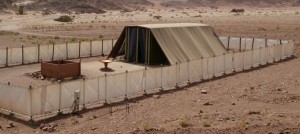
A Modern Replica of the Mishkan in Timna, Israel
This week’s parasha, Terumah, begins the Torah’s lengthy descriptions of the Mishkan, the “mobile sanctuary” or “tabernacle”. Fittingly, the Haftarah is a passage from I Kings describing King Solomon’s construction of the Jerusalem Temple, the permanent version of the Mishkan. Once the Temple was completed, it seems that Solomon actually brought the original Mishkan into the Temple and “parked” it there (I Kings 8:4-6). As per tradition, Solomon foresaw the future destruction of his own Temple, and made sure to build a secret chamber within the Temple Mount to hide the Ark of the Covenant and the original Mishkan vessels there, for safekeeping until the Final Redemption and the Third Temple.
The basic details of his biography are well-known: he reigned as king of a unified Israel for 40 years in a peaceful era (alluded to by his name, Shlomo, meaning “peace”); he had many wives and concubines; and he wrote three books of Tanakh: Mishlei (“Proverbs”), Kohelet (“Ecclesiastes”), and Shir haShirim (“Song of Songs”). What else do we know about this enigmatic king? Some of the lesser-known details will surely surprise you! Continue reading

